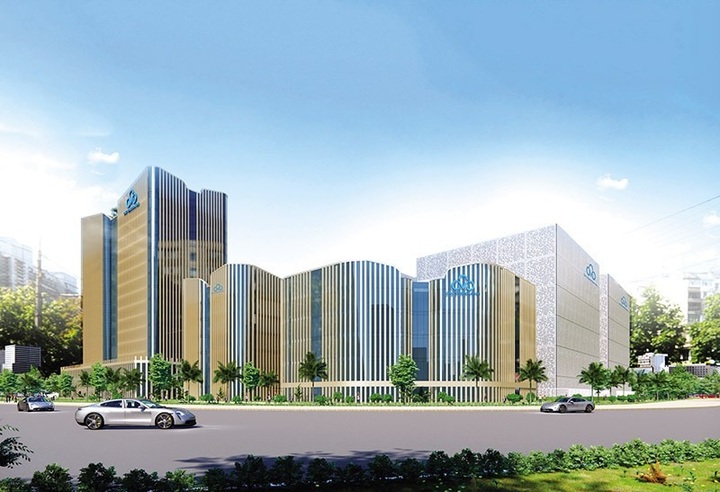
A perspective of CMC Group’s CMC Hyperscale DC data centre project in Ho Chi Minh City. (Photo: VNA)
Booming investments across the country
According to Cushman & Wakefield’s latest Asia-Pacific Data Centre Investment Landscape report, Vietnam now ranks second in Southeast Asia for data centre investment returns, with a yield on cost (YoC) of 17.5 to 18.8 per cent, just behind Singapore’s 21 to 23 per cent.
Several major projects have launched in 2025. In Ho Chi Minh City, CMC Group received approval to build its CMC Hyperscale DC in the Saigon Hi-Tech Park. With an initial capacity of 30 MW, scalable to 120 MW, the USD 250 million facility is set to break ground in 2026.
Also in HCM City, Viettel began construction in April on a 140 MW data centre in Tan Phu Trung Industrial Park. Spanning nearly 4 hectares, the facility will house up to 10,000 racks and is expected to partially open in Q1 2026.
Meanwhile, VNPT recently opened its eighth data centre in Hanoi’s Hoa Lac Hi-Tech Park, offering 2,000 racks in a Tier III Uptime-certified facility spanning 23,000 square metres.
VNG has launched a 12,400-square-metre centre in Tan Thuan Export Processing Zone with 410 racks, planning to expand to 1,600. FPT Telecom and MobiFone are also aggressively expanding internationally certified data infrastructure.
Viettel Chairman Tao Duc Thang said the firm is transitioning from traditional to hyperscale centres to support national AI applications, big data, and cloud computing. CMC Chairman Nguyen Trung Chinh said their investment aims to attract global AI firms and establish HCM City as a regional digital hub.
Competitive edge and rising demand
Vietnam boasts some of Asia’s lowest development costs at USD 7.1 million per MW, compared to the regional average of USD 10.1 million and Japan’s USD 16.1 million. Capitalisation rates in Vietnam also remain higher than regional peers at 7 to 8 per cent.
Pritesh Swamy, head of research at Cushman & Wakefield’s Asia-Pacific Data Centre Group, noted that Vietnam’s policies enabling 100 per cent foreign ownership in data centre operations significantly boost its attractiveness. The revised Law on Telecommunications, effective from July 1, 2024, reinforces this shift.
Research and Markets forecasts that Vietnam’s data centre market could hit USD 1.6 billion by 2030, with a compound annual growth rate of 15 to 18 per cent.
The global boom in AI, IoT, 5G, blockchain, and next-generation cloud models is driving demand. AI servers now account for over 72 per cent of global server investments, up from 46 per cent in 2024, according to Viettel IDC Director Le Ba Tan.
He noted a shift towards leasing models, with companies like Meta spending more than USD 14 billion on third-party data centre capacity to meet growing AI needs.
Vu The Binh, Secretary General of the Vietnam Internet Association, said Vietnam’s neutrality, competitive costs, and rising local demand position it as a strong contender against Thailand and Indonesia, with potential to rival Singapore in the mid-tier segment.
Strategically located near subsea cable routes, cities like Hanoi, HCM City, Da Nang, and Bac Ninh are emerging as prime destinations due to high-bandwidth connectivity.
Challenges ahead
Despite the promise, challenges persist. Hyperscale centres demand stable power supplies and skilled professionals. Vietnam still lags behind regional peers in digital infrastructure, with only five undersea cable routes and two more under development.
Experts say that with improved connectivity, stable energy access, and supportive policies, Vietnam could become Southeast Asia’s new data hub within five to ten years. In the AI and data-driven age, the country is well-positioned to export digital services and reshape the global data centre landscape.




















